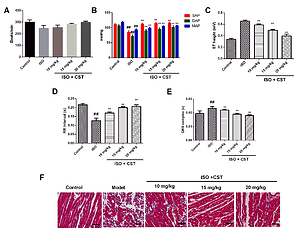Current issue
Archive
Manuscripts accepted
About the Journal
Editorial office
Editorial board
Section Editors
Abstracting and indexing
Subscription
Contact
Ethical standards and procedures
Most read articles
Instructions for authors
Article Processing Charge (APC)
Regulations of paying article processing charge (APC)
CARDIOLOGY / RESEARCH PAPER
Protective effect of casticin in myocardial ischemia/reperfusion injury in rats via attenuation of oxidative stress and inflammation
1
Department of Cardiology, China-Japan Union Hospital of Jilin University, Changchun,
China
2
Department of Nephrology, China-Japan Union Hospital of Jilin University, Changchun,
China
3
Department of Geriatric Medicine, China-Japan Union Hospital of Jilin University,
Changchun, China
Submission date: 2020-07-06
Final revision date: 2020-09-03
Acceptance date: 2020-09-17
Online publication date: 2021-05-09
Corresponding author
KEYWORDS
TOPICS
ABSTRACT
Introduction:
Myocardial ischemic/reperfusion injury is the main prognostic factor after myocardial infarction. However, by the time reperfusion is achieved, the cardiac tissues have already undergone necrosis and initiated inflammation and oxidative stress. Therefore, the present study aimed to evaluate the beneficial effect of casticin (CST) on myocardial ischemia/ reperfusion (MI/R) injury and to explore its mechanism of action.
Material and methods:
MI/R injury was induced using 30-min left anterior descending coronary artery (LAD) occlusion followed by 4 h reperfusion. CST was administered to rats before reperfusion. The outcome of CST was determined according to various indices of oxidative stress, inflammation, apoptotic genes and nuclear factor k-light-chain-enhancer of activated B cells (NF-kB).
Results:
The results suggested that CST causes significant improvement in left ventricular systolic pressure (LVSP) and derivative of pressure over time of maximal rate of rise of (usually) left ventricular pressure (± dp/dtmax) with reduction of left ventricular end-diastolic pressure (LVEDP). It also reduces increased ST segment together with restoration of the changes in RR interval and QRS complex. The histopathological analysis of cardiac tissue further corroborated the effect of CST. It also causes improvement of the antioxidant system by reducing malondialdehyde (MDA) level with increase in superoxide dismutase (SOD) and glutathione peroxidase (GPx). The levels of cytokines (TNF-α, IL-1β and IL-6) were also found to be reduced upon CST treatment. The expression of NF-kB, inducible nitric oxide synthase (iNOS) and BCL2-associated X protein (Bax) was found to be reduced in the CST treated group together with an increase in Bcl-2.
Conclusions:
Collectively, the results of the study demonstrated that casticin protects rats from MI/R damage possibly via attenuation of oxidative stress, the inflammatory response and apoptosis. It was also shown to inhibit NF-kB and iNOS in western blot analysis.
Myocardial ischemic/reperfusion injury is the main prognostic factor after myocardial infarction. However, by the time reperfusion is achieved, the cardiac tissues have already undergone necrosis and initiated inflammation and oxidative stress. Therefore, the present study aimed to evaluate the beneficial effect of casticin (CST) on myocardial ischemia/ reperfusion (MI/R) injury and to explore its mechanism of action.
Material and methods:
MI/R injury was induced using 30-min left anterior descending coronary artery (LAD) occlusion followed by 4 h reperfusion. CST was administered to rats before reperfusion. The outcome of CST was determined according to various indices of oxidative stress, inflammation, apoptotic genes and nuclear factor k-light-chain-enhancer of activated B cells (NF-kB).
Results:
The results suggested that CST causes significant improvement in left ventricular systolic pressure (LVSP) and derivative of pressure over time of maximal rate of rise of (usually) left ventricular pressure (± dp/dtmax) with reduction of left ventricular end-diastolic pressure (LVEDP). It also reduces increased ST segment together with restoration of the changes in RR interval and QRS complex. The histopathological analysis of cardiac tissue further corroborated the effect of CST. It also causes improvement of the antioxidant system by reducing malondialdehyde (MDA) level with increase in superoxide dismutase (SOD) and glutathione peroxidase (GPx). The levels of cytokines (TNF-α, IL-1β and IL-6) were also found to be reduced upon CST treatment. The expression of NF-kB, inducible nitric oxide synthase (iNOS) and BCL2-associated X protein (Bax) was found to be reduced in the CST treated group together with an increase in Bcl-2.
Conclusions:
Collectively, the results of the study demonstrated that casticin protects rats from MI/R damage possibly via attenuation of oxidative stress, the inflammatory response and apoptosis. It was also shown to inhibit NF-kB and iNOS in western blot analysis.
Share
RELATED ARTICLE
We process personal data collected when visiting the website. The function of obtaining information about users and their behavior is carried out by voluntarily entered information in forms and saving cookies in end devices. Data, including cookies, are used to provide services, improve the user experience and to analyze the traffic in accordance with the Privacy policy. Data are also collected and processed by Google Analytics tool (more).
You can change cookies settings in your browser. Restricted use of cookies in the browser configuration may affect some functionalities of the website.
You can change cookies settings in your browser. Restricted use of cookies in the browser configuration may affect some functionalities of the website.



